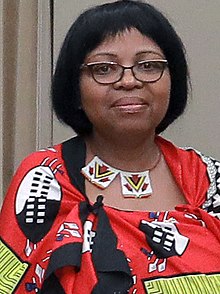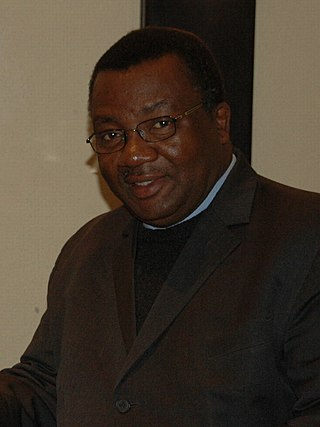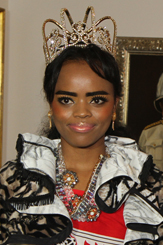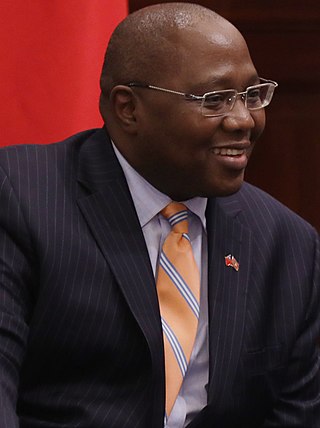Tsandzile Dlamini is a princess of Eswatini who currently serves as Minister of Home Affairs.
Contents

Tsandzile Dlamini is a princess of Eswatini who currently serves as Minister of Home Affairs.

Dlamini is the daughter of King Sobhuza II and Inkhosikati Gogo Mngometulu and the younger sister of King Mswati III. [1] She has a degree in psychology from Boston and a master's degree in Archives Administration from India. [2]
Dlamini worked as an archivist. She was appointed as a Member of House of Assembly of Eswatini in 2003, one of the king's ten constitutionally allowed appointments, along with two other brothers. [2] In 2008, she was appointed Minister of Natural Resources and Energy. [3] In 2010, she was named as one of a number of ministers who were allowed to buy 'crown land' at below market value in a "questionable land deal." [4] On 4 November 2013, she was appointed Minister for Home Affairs. [5] [6]
Dlamini has been married to Musa Mdluli since 1989 and they have two children. [7] In 2016, the king received a gift of 140 cattle as a bride price for her. [8]

Eswatini, officially the Kingdom of Eswatini and formerly named Swaziland, is a landlocked country in Southern Africa. It is bordered by Mozambique to its northeast and South Africa to its north, west, south, and southeast. At no more than 200 km (120 mi) north to south and 130 km (81 mi) east to west, Eswatini is one of the smallest countries in Africa; despite this, its climate and topography are diverse, ranging from a cool and mountainous highveld to a hot and dry lowveld.

Artifacts indicating human activity dating back to the early Stone Age have been found in the Kingdom of Eswatini. The earliest known inhabitants of the region were Khoisan hunter-gatherers. Later, the population became predominantly Nguni during and after the great Bantu migrations. People speaking languages ancestral to the current Sotho and Nguni languages began settling no later than the 11th century. The country now derives its name from a later king named Mswati II. Mswati II was the greatest of the fighting kings of Eswatini, and he greatly extended the area of the country to twice its current size. The people of Eswatini largely belong to a number of clans that can be categorized as Emakhandzambili, Bemdzabu, and Emafikamuva, depending on when and how they settled in Eswatini.

Mswati III is the king of Eswatini and head of the Swazi royal family. He was born in Manzini in the Protectorate of Swaziland to King Sobhuza II and one of his younger wives, Ntfombi Tfwala. He was crowned as Mswati III, Ingwenyama and King of Swaziland, on 25 April 1986 at the age of 18, thus becoming the youngest ruling monarch in the world at that time. Together with his mother, Ntfombi Tfwala, now Queen Mother (Ndlovukati), he rules the country as an absolute monarch. Mswati III is known for his practice of polygamy and currently has 15 wives.

Absalom Themba Dlamini was the Prime Minister of Eswatini from November 2003 to September 2008. He is the managing director of Tibiyo Taka Ngwane.

The Swazi or Swati are a Bantu ethnic group native to Southern Africa, inhabiting Eswatini, a sovereign kingdom in Southern Africa. EmaSwati are part of the Nguni-language speaking peoples whose origins can be traced through archaeology to East Africa where similar traditions, beliefs and cultural practices are found.

Queen Ntfombi, The Queen Mother, Ndlovukati of Eswatini is the current Ndlovukati and joint head of state of Eswatini, serving since 1986. She was also regent of Eswatini from 1983 to 1986. She is the mother of King Mswati III.

Ndlovukati is the Siswati title for the female monarch of Eswatini. The title is given preferentially to the mother of the reigning king, or to another female royal of high status if the king's mother has died. The title is roughly equivalent to a queen mother, though she is jointly head of state, ruling alongside the Ngwenyama. The title can also mean doctor. When there is no king, the Ndlovukati rules as queen regent. The current Ndlovukati is Queen Ntfombi Tfwala, the mother of Ngwenyama Mswati III and wife of Sobhuza II. She was also queen regent from 1983 until 1986 when Mswati became king. The most notable queen regent was Ndlovukati Labotsibeni Mdluli who ruled Swaziland from 1899 until 1921 when she abdicated for Sobhuza II.
Lobamba is a city in Eswatini, and is one of the two capitals, serving as the legislative, traditional, spiritual, seat of government of the Parliament of Eswatini, and Ludzidzini Royal Village, the residence of Queen Ntfombi, the Queen Mother.

Prince Barnabas Sibusiso Dlamini was a Swazi politician who served as Prime Minister of Eswatini, from 1996 to 2003 and again from October 2008 to September 2018.
Natan Gamedze is a Haredi rabbi and lecturer. Born to the royal lineage of the Gamedze clan of the Kingdom of Eswatini, he converted to Judaism, received rabbinic ordination, and now lectures to Jewish audiences all over the world with his personal story as to how an African prince became a Black Haredi Jewish rabbi.
Mbandzeni (1855–1889) was the King of Swaziland from 1872 until 1889. Ingwenyama Mbandzeni was the son of Mswati II and Nandzi Nkambule. His mother the wife of King Mswati had died when he was still very young. Mbandzeni ascended to the throne after his half brother Ludvonga II died before he could become the king. Ludvonga's death resulted in his mother Inkhosikati Lamgangeni adopting Mbandzeni who was motherless as her son, thus making him King and her the Queen mother of Swaziland. His royal capital was at Mbekelweni. During his kingship Mbandzeni granted many mining, farming, trading and administrative concessions to white settlers from Britain and the Transvaal. The Boers had tricked the king into signing permanent land concesions. The king could not read or write, so the Boers made him sign the concessions with a cross. The king was told that these were not permanent land concessions but the papers themselves stated otherwise. These concessions granted with the help of Offy Sherpstone eventually led to the conventions of 1884 and 1894, which reduced the overall borders of Swaziland and later made Swaziland a protectorate of the South African Republic. During a period of concessions preceded by famine around 1877 some of the tindvunas (governors) from within Swaziland like Mshiza Maseko and Ntengu kaGama Mbokane were given permission by King Mbandzeni to relocate to farms towards the Komati River and Lubombo regions, Mshiza Maseko later settled in a place called eLuvalweni towards Nkomati River, where he was later buried. Mbandzeni, still in command of a large Swazi army of more than 15,000 men aided the British in defeating Sekhukhune in 1879 and preventing Zulu incursion into the Transvaal during the same year. As a result, he guaranteed his country's independence and international recognition despite the Scramble for Africa which was taking place at the time. Mbandzeni died after an illness in 1889 and is quoted to have said in his deathbed "the Swazi kingship dies with me". He was buried at the royal cemetery at Mbilaneni alongside his father and grandfather Sobhuza I. Mbandzeni was succeeded by his young son Mahlokohla and his wife Queen Labotsibeni Mdluli after a 5 year regency of Queen Tibati Nkambule. Today a number of buildings and roads in Swaziland are named after Mbandzeni. Among these the Mbandzeni house in Mbabane and the Mbandzeni Highway to Siteki are named after him.

The House of Dlamini is the royal house of the Kingdom of Eswatini. Mswati III, as king and Ngwenyama of Eswatini, is the current head of the house of Dlamini. Swazi kings up to the present day are referred to as Ingwenyama and they rule together with the Queen Mother who is called Indlovukati. The Swazi kings, like other Nguni nations, practice polygamy and thus have many wives and children.

Princess Sikhanyiso Dlamini is a Swazi princess and politician. She is the eldest daughter of King Mswati III of Eswatini, and is the country's current Minister of Information and Communication Technology.

In Eswatini, no king can appoint his successor. Instead, an independent special traditional Council called the Liqoqo decides which of the wives shall be "Great Wife" and "Indlovukazi". The son of this "Great Wife" will automatically become the next king.

Themba Nhlanganiso Masuku is a Swazi politician who has served as Deputy Prime Minister of Eswatini since 2018 and as Acting Prime Minister from 13 December 2020 to 16 July 2021. Earlier, he served as Deputy Prime Minister from 2008 until 2013.

Sibonelo Mngometulu is the third Inkhosikati and wife of the king of Eswatini. She is known as LaMbikiza, after her father's name Mbikiza. Sibonelo married Mswati III in 1986. She has two children with the king, Princess Sikhanyiso Dlamini, and Prince Lindani Dlamini.

Eswatini–India relations refers to the international relations that exist between Eswatini and India. India also maintains a resident High Commission in Mbabane established on 13 August, 2019. Eswatini does not have a diplomatic mission in India.

Ambrose Mandvulo Dlamini was a Swazi business executive who served as the tenth prime minister of Eswatini, holding the office from October 2018 until his death on 13 December 2020.